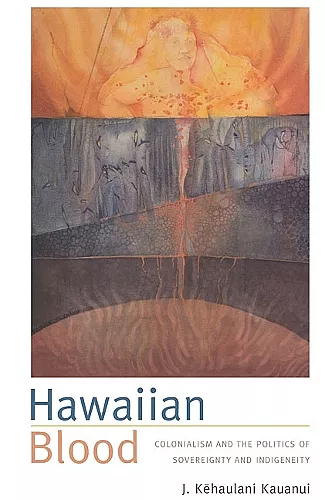Hawaiian Blood
Colonialism and the Politics of Sovereignty and Indigeneity
Format:Hardback
Publisher:Duke University Press
Published:7th Nov '08
Currently unavailable, and unfortunately no date known when it will be back
This hardback is available in another edition too:
- Paperback£21.99(9780822340799)

Study of the legal and cultural effects of the "fifty-percent blood quantum" rule first instituted in the 1920s
In 1921 the US Congress officially defined "Native Hawaiians" as those people with at least one-half blood quantum of individuals inhabiting the Hawaiian Islands prior to 1778. This book provides a history and analysis of how a federal law equating Hawaiian cultural identity with a quantifiable amount of blood was created.In the Hawaiian Homes Commission Act (HHCA) of 1921, the U.S. Congress defined “native Hawaiians” as those people “with at least one-half blood quantum of individuals inhabiting the Hawaiian Islands prior to 1778.” This “blood logic” has since become an entrenched part of the legal system in Hawai‘i. Hawaiian Blood is the first comprehensive history and analysis of this federal law that equates Hawaiian cultural identity with a quantifiable amount of blood. J. Kēhaulani Kauanui explains how blood quantum classification emerged as a way to undermine Native Hawaiian (Kanaka Maoli) sovereignty. Within the framework of the 50-percent rule, intermarriage “dilutes” the number of state-recognized Native Hawaiians. Thus, rather than support Native claims to the Hawaiian islands, blood quantum reduces Hawaiians to a racial minority, reinforcing a system of white racial privilege bound to property ownership.
Kauanui provides an impassioned assessment of how the arbitrary correlation of ancestry and race imposed by the U.S. government on the indigenous people of Hawai‘i has had far-reaching legal and cultural effects. With the HHCA, the federal government explicitly limited the number of Hawaiians included in land provisions, and it recast Hawaiians’ land claims in terms of colonial welfare rather than collective entitlement. Moreover, the exclusionary logic of blood quantum has profoundly affected cultural definitions of indigeneity by undermining more inclusive Kanaka Maoli notions of kinship and belonging. Kauanui also addresses the ongoing significance of the 50-percent rule: Its criteria underlie recent court decisions that have subverted the Hawaiian sovereignty movement and brought to the fore charged questions about who counts as Hawaiian.
“Hawaiian Blood is an important work that addresses the racialization of Hawaiians in a way that no other work has done. J. Kēhaulani Kauanui reveals how the fifty-percent blood quantum continues to divide the Native Hawaiian community and how it is affecting current court decisions and legislation. These analyses are crucial for the Hawaiian community as it continues to move to define itself and to exercise self-determination and sovereignty.”—Noenoe K. Silva, author of Aloha Betrayed: Native Hawaiian Resistance to American Colonialism
“Hawaiian Blood tells a fascinating and important story that has not received sufficient attention in the historical research on Hawai‘i nor in the work on indigenous peoples more generally. Well written, accessible to students and sophisticated in its analysis, this book offers provocative new insights and theoretical perspectives on how we think about and use notions of race, blood, and belonging.”—Sally Engle Merry, author of Colonizing Hawai‘i: The Cultural Power of Law
“Hawaiian Blood is an important study that brings a complex issue to light and fills a gap in the literature on both indigenous and American studies.” -- Eileen H. Tamura * Journal of American History *
“Hawaiian Blood obviously is required reading for anyone interested in Hawaiian history, but it can be profitably read by others concerned with ethnicity, land rights, definitions of welfare and more issues than a brief review can encompass. Though I have lived in the islands intermittently for almost 60 years, I found I could still learn from Kauanui’s book and am therefore profoundly grateful to her.” -- Eugene Ogan * Pacific Affairs *
“Kauanui is a passionate critic of the concept of blood quantum, and her engagement with the issue of Hawaiian identity yields insights throughout the book, especially concerning the ways in which the law can work as a subtle agent of colonization.” -- Stuart Banner * Pacific Historical Review *
“The broader historical and anthropological questions raised by this study are thoroughly engaging, beginning with the metrics through which ‘Hawaiian’ identity and community membership should be measured. . . . Kauanui’s informed voice, as a scholar and Hawaiian, deserves a large and attentive audience in the coming debates over sovereignty and indigeneity.” -- David Igler * American Historical Review *
“This book is incredibly important in building a new understanding of colonization and racialization in Hawai’i, and is a must read for anyone interested in American Studies, Indigenous Studies, and/or Critical Race Studies.” -- Judy Rohrer * American Studies *
“This work is an ambitious and carefully argued account of how the peoples of Hawaii moved across multiple modes of being: from a self-ruled polyglot community to becoming conquered United States colonial subjects and, eventually, transformed into culturally and legally segmented ‘American’ citizens made to submit to ‘blood quantum’ rules. . . . [A]n exceedingly well written and well argued work on a complex case.” -- Cherubim Quizon * Anthropological Quarterly *
ISBN: 9780822340584
Dimensions: unknown
Weight: 503g
264 pages